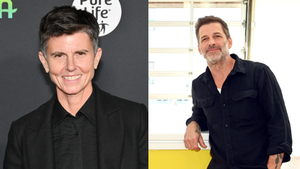CONTACTCAREER OPPORTUNITIESADVERTISE WITH USPRIVACY POLICYPRIVACY PREFERENCESTERMS OF USELEGAL NOTICE
© 2025 Pride Publishing Inc.
All Rights reserved
All Rights reserved
By continuing to use our site, you agree to our Privacy Policy and Terms of Use.
How did the British theater become so queer? Shakespeare helped the gay launch by inventing the kind of moony, hypersensitive, casually suicidal, drama-queen protagonists who weren't just dead ringers for your best friends but also pioneering gay prototypes.
Restoration fops picked up the baton, and by the time Noel Coward was defining the arch tone for modern British comedy, matched by his permanently arched eyebrows, English theater was swishing so wildly it just couldn't stop.
The result today is probably the most homo-heavy performance lineup of any commercial medium. Take a look at the recent season of London theater -- from the experimental performance spaces to the grande dame West End theaters -- and almost every production trails at least some queer whiff. Among the hits: a fresh revival of the homo warhorse Cabaret; Equus, starring a post pubescent, hairier Harry Potter stripping off; the long-running Billy Elliot, whose "little boy wants to be a dancer" story line speaks to every gay man in the teary-eyed audience; the two-gay-icons-for-the-price-of-one production of The Lady From Dubuque, written by Edward Albee and offering a transcendently hammy Maggie Smith; and a revival of Kiss of the Spider Woman.
Over at the Drill Hall, a gay performance space, Take Me With You was exploring the long-running battle between religion and homosexuality in contemporary America, and the debut of Twisted at the Oval House was depicting a drug-fueled gay weekend gone wrong. The butchest play of the lot was a new production of The Sound of Music -- if you can call boys in sailor suits, sleigh bells and kittens, and a purely asexual heroine, clearly more at home with the nuns, a manly experience.
None of this gay theatrical outpouring surprises playwright Martin Sherman, whose pioneering play Bent was recently restaged in London, starring Alan Cumming as one of the two gay concentration camp inmates. The play's British homecoming is fitting.
"England experimented with openly gay plays before America did," Sherman notes, "and Bent debuted in London in 1979 to tremendous word of mouth. At that time there was no such thing as a gay play on Broadway."
And London's reputation for assuming risks has continued. "People take more chances here," Sherman stresses, "and playwrights are able to produce plays without endlessly workshopping them here, partly because in England we have subsidized theater."
The result isn't just strong gay theater but something more substantial; London is probably home now to the most ambitiously experimental, creative theater of any kind, anywhere in the world. That means the city doesn't just attract serious playwrights but also lures England's best young actors, including Chris New, whose personal trajectory is a barometer of how gay West End theater has become. New won recognition playing Cumming's lover in the Bent revival, followed up with a role as the dissolute boyfriend of a closeted gay journalist in The Reporter, and is in rehearsal for his first professional nongay role, which isn't exactly a study in flagrant heterosexuality: the cross-dressing Viola in Twelfth Night, directed by gay novelist Neil Bartlett.
New, though, emphasizes that his roles suggest more about the ambition and creativity of British theater than just its gay seam. "I was trained at RADA [Royal Academy of Dramatic Art], which turned 100 years old recently, and you're so conscious of the century of actors who came before you: John Gielgud, Alan Rickman, Kenneth Branagh. You take on the responsibility of that reputation, both to the tradition and to the need to drag that tradition into the future."
It's that sense of responsibility more than anything that may be the real secret to London's theatrical muscle, the ability to build on a stellar past without breaking its ambitious, forward-thinking stride. The payoff for New is a visible one.
"A lot of people had to leave the theater during our performance [of Bent], because they were crying so hard. And a good play should do that; it should pummel you in the gut." Softer theatergoers may disagree.
LONDON THEATERS
The Donmar Warehouse
The Drill Hall
THE GRAND TOUR
The Grand Tour: Euro culture capitals
Down the hatch in Dublin
Life's a banquet in Copenhagen
Art for art's sake in Berlin
Model behavior in Milan
From our Sponsors
Most Popular
Just in Time for Pride – The 15 Gayest Cities in the World in 2023
April 12 2023 6:47 PM
The 13 Least Visited National Parks
January 07 2023 5:00 AM
Get Soaked! with These 35+ Steamy Pool Pics From This Year’s White Party
May 25 2023 9:29 AM
20 Thirsty Pics of #SniffiesRush Campaign Celebrating Frat Life
December 16 2022 3:19 PM
25 Thirsty Pool Party Pics from White Party Palm Springs 2022
April 14 2023 5:55 PM
Sniffies Reveals Horniest Cities
December 22 2022 4:15 PM
15 Thirsty Pics of Moot Lingerie for Men
March 21 2023 7:41 AM
The 7 Best Nude Beaches for Gays in the U.S.
June 09 2022 4:00 AM
The Most Dangerous (& Safest) Countries for LGBTQ+ Travel
March 22 2023 5:00 AM
Outtraveler: Featured Video
Latest Stories
A gay solo traveler goes bear-hunting in Barcelona
November 13 2025 4:31 PM
More than a month: Prioritizing LGBTQ+ health year-round
October 15 2025 12:27 PM
UNITY at Sphere is the perfect Las Vegas attraction for gay tourists
October 03 2025 5:09 PM
Malta is the secret Pride destination where gays are going wild
September 18 2025 4:47 PM
What is a Jubilee? These Catholics just became the first LGBTQ+ people to participate
September 08 2025 12:49 PM
Marriage equality will be banned in these 31 states if Obergefell is overturned
September 08 2025 10:40 AM
Explore the camp, parties, and parade of Provincetown Carnival 2025
September 05 2025 7:03 PM
My big gay Broadway summer
August 27 2025 9:27 AM
Explore Zurich with Swiss style icon Susanne Bartsch
August 25 2025 9:46 AM
Splash House is the secret Pride festival where gays can truly let loose
August 22 2025 9:00 AM
When love sinks, set sail for the Hudson Navigator
August 15 2025 6:00 AM
Need an escape from American anxiety? Consider Colombia.
July 16 2025 11:47 AM
This heavenly hotel in the heart of Hell's Kitchen is the perfect oasis
June 26 2025 6:00 AM
Top 10 LGBTQ+ beach towns perfect for Pride and summer fun
June 05 2025 1:54 PM
Checking out: nhow London, the city’s coolest hotel
June 02 2025 8:45 AM
Cruising the world helped this gay couple find lasting love
May 31 2025 2:45 PM
Gays went feral at an iconic Pride celebration in Pensacola, Florida
May 30 2025 6:00 AM
Wilderness, woods, and Wigstock: Drag icons light up the Catskills
May 28 2025 12:17 PM
Out and About with Christian Cooper
May 28 2025 11:07 AM












































































